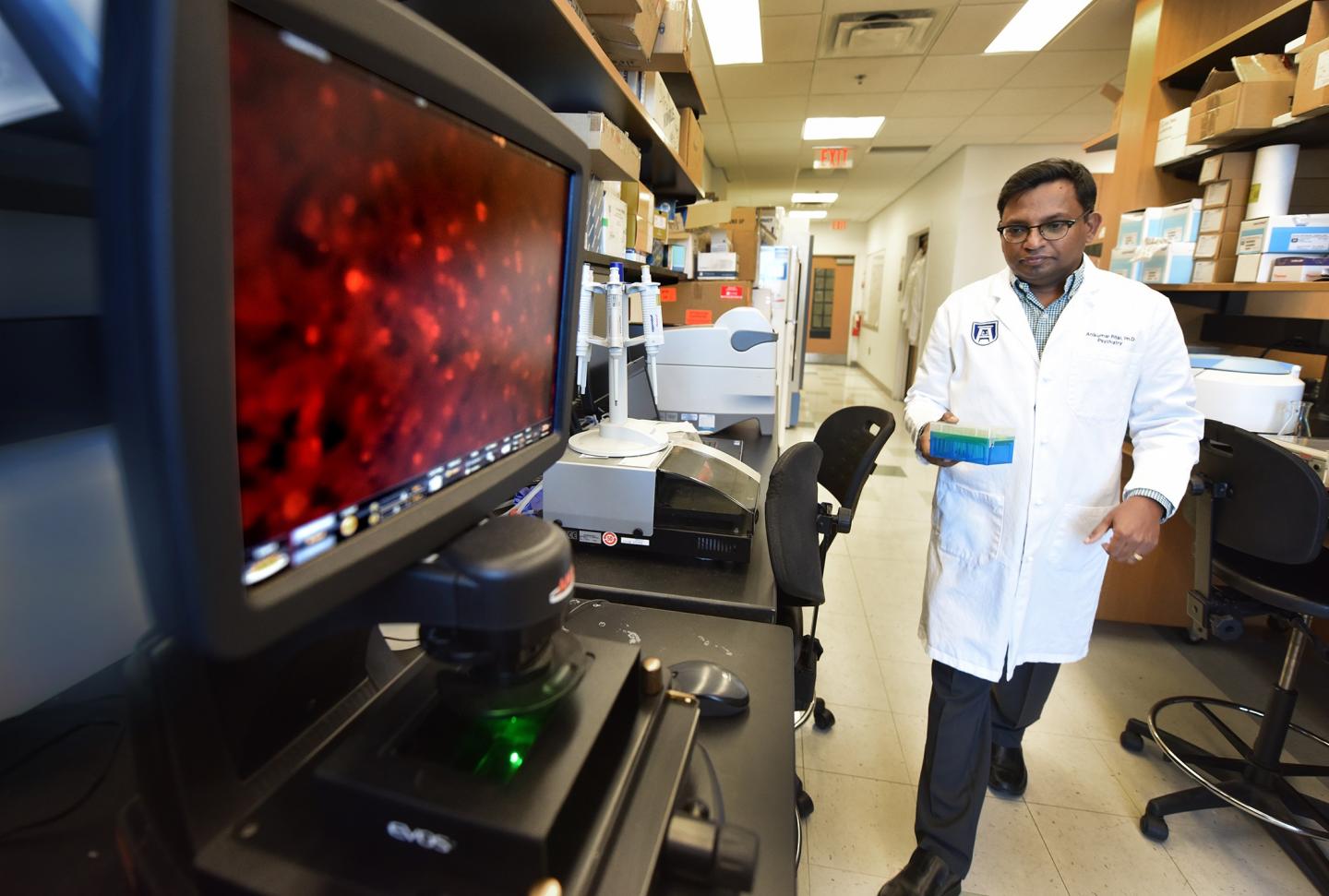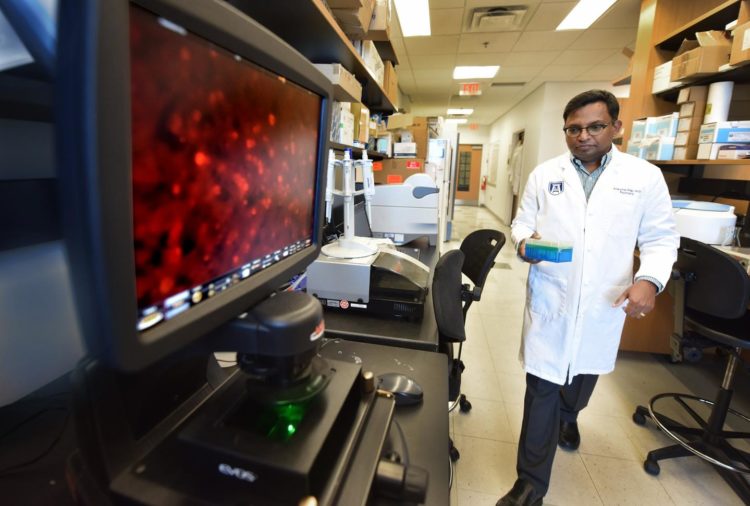
Credit: Phil Jones, Senior Photographer, Augusta University
AUGUSTA, Ga. (Nov. 21, 2019) – Chronic stress can inflame our brain, destroy the connections between our neurons and result in depression, scientists say.
Now they are working to better understand how the destructive cycle happens and how best to intervene.
Even powerful, prescription anti-inflammatory drugs that should help break the connectivity between chronic stress and inflammation don’t help many patients with depression, says Dr. Anilkumar Pillai, neuroscientist in the Department of Psychiatry and Health Behavior at the Medical College of Georgia at Augusta University.
Two new grants totaling about $2.4 million from the National Institute of Mental Health are helping Pillai further explore his increasing evidence that the problem may start with the impact stress has on our bodies and the body’s fundamental, frontline and nonspecific immune response called innate immunity.
The complement system, named because it was first found to help the immune system fight invaders, is part of this innate immune response, and Pillai has found elevated levels of C3 — which he calls the hub of all complement activation pathways — in both the brains of people with depression and animal models.
The complement system also has the important job during development of removing bad connections between neurons, and there is good evidence the same thing happens in a developed brain in problems like major depressive disorder and Alzheimer’s, when losing these important connections, called synapses, is problematic rather than helpful.
“You have to have a functioning complement system during development,” says Pillai. But he and his research colleagues have put together some of the first evidence that in depression, the complement also is active, causing inflammation and synaptic loss in the prefrontal cortex, an area of the brain important to working memory, personality and executive function. “Under chronic stress you are losing your synapses,” he says.
C3 is known to play a key role in inflammation in the brain, and microglia, the resident immune cells in the brain, are known to use C3 during brain development to eliminate synapses.
“We expect that chronic stress increases C3,” Pillai says as he continues to put the complex puzzle together. Now he and his colleagues want to know where the high C3 is coming from, whether it’s the immune cells called monocytes, circulating in the body in response to stress, or the microglia. It may turn out that microglia are the direct source but changes chronic stress makes to the body are the instigators in this vicious, destructive circle.
Studies have shown that chronic stress is a major factor in depression, says Pillai. In fact, people with physical health problems like cancer or heart disease where inflammation also is a major factor, often develop depression, and at least one reason is that high levels of inflammation that are impacting the body also may be affecting the brain, Pillai says.
“They are basically bidirectionally fueling each other,” he says. “It’s not everyone; it’s a subset of individuals with these conditions.”
In a paper published in March 2018 in the journal Brain, Behavior and Immunity, Pillai’s lab reported significant increases in C3 expression in the prefrontal cortex of depressed individuals who had committed suicide. They also found increased C3 expression in the prefrontal cortex of mice in response to chronic stress but that mice lacking C3 did not get depressive-like behavior in response. In fact, just causing overexpression of C3 in certain areas of the prefrontal cortex caused depression-like behavior, even without the stress.
Their early findings indicate that when NF-kappa B, a transcription factor that regulates both innate and adaptive immunity and is implicated as a key regulator of inflammation in depression, is inhibited, stress-induced increases of C3 in a mouse’s prefrontal cortex are reduced. Depleting microglia appears to do essentially the same thing.
This time they are bringing down both levels of C3 and its receptors in microglia as well as peripheral monocytes to further parse the role of the complement system and the source of C3.
Pillai’s collaborators include Dr. Stephen Tomlinson, an expert in the complement system and central nervous system inflammation, who is interim chair of the Department of Microbiology and Immunology at the Medical University of South Carolina College of Medicine. One of the many things Tomlinson’s lab does is generate complement inhibitors, including drugs that block C3’s activation through different pathways, which Pillai is using for these studies and will give additional insight into how activation is happening.
If the complement inhibitors work in animal models, some iteration of these research drugs may also one day help people with depression based on their level of inflammation, Pillai says.
The second NIMH grant is enabling additional studies of how microglia get activated and Pillai suspects it’s interferon alpha circulating in the body that get the microglia and C3 going.
Interferon alpha is a drug used to treat maladies like cancer and hepatitis, but it’s also a natural protein that stimulates the immune system to kill things like melanoma and viral infections.
High levels of interferon alpha have been found in the blood of people with depression, and long-term interferon alpha treatment for problems like cancer or chronic hepatitis B can trigger depression or other mental health problems. Even healthy lab animals injected with interferon alpha exhibit depressive symptoms.
The MCG scientists have seen treatment with an interferon receptor antibody reduce social-deficient and depression-like behavior in mice exposed to chronic stress.
The new studies will enable further exploration of their hypothesis that increased interferon alpha activation in the body by stress activates microglia and their C3 production in the brain, which leads to loss of neuron connections and depressed behavior. These studies include use of an interferon receptor antibody to block its action. The fact that interferon alpha goes up in the face of chronic stress is another indicator the body doesn’t like stress, Pillai notes.
Immune cells in the brain are typically not as reactive as those circulating in the rest of the body, but stress definitely gets their attention, Pillai says. The major immune function of C3 is mediated through microglia in the brain and monocytes throughout the body, another reason he wants to knock out C3 in both cell types to see the effect.
Current anti-inflammatory therapies have focused on inflammation generated by adaptive immunity, an immune response specific to some invader like a bacterium, rather than less specific innate immunity. But innate immunity is becoming a target in other conditions like cancer and cardiovascular disease, and its role in both inflammation and synapse regulation peaked Pillai’s interest in its role in depression.
###
Media Contact
Toni Baker
[email protected]
706-721-4421





